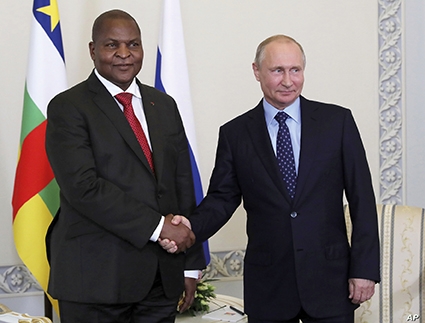Russia’s Economic Offensive in Africa
Over the past couple of years, as the world has watched how Russia successfully propped up its position in Syria, Venezuela, etc.. Yet, less attention has been paid to Moscow’s ambitions in the vast African continent.
Russia recently won over the strategically placed Central African Republic (CAR). The country is strategically important as it is located between the Muslim north and Christian South. Beyond geography, the country also has a sizeable amount of oil, diamonds, gold and uranium resources.
The Russian offensive in CAR comes following a period of inattention to the country from the US. Moscow’s efforts, however, are not limited to CAR as there are signs that Russia’s involvement in the continent is set to widen beyond its existing boundaries. Indeed, it was reported that later this year, in October, Putin and Egyptian President Abdel Fatah al-Sisi will convene 50 African leaders at the first-ever Russian-African Summit in Sochi.
There have also been reports in the media that Russia intends to increase its presence in at least 13 African countries. Moreover, Russia increasingly steps in with trade and business agreements, military sales and cooperation, and political and paramilitary support.
Russia deployed private military contractors to the Central African Republic to deliver arms, train government forces and provide personal protection to the president. Similar steps were taken in Libya, while in Sudan, Russian advisers supported al Bashir. Moreover, in May, Russia announced plans to deploy technical experts to the Republic of the Congo to train local forces to use Russian military equipment. For Moscow, the African continent is also an emerging nuclear energy market as well as a growing agricultural export ground for Russian wheat.
On a larger level, despite Moscow’s partial failures in Sudan and even South Africa, its moves are generally quite successful and come amid a geopolitical vacuum in Africa created by Europe and US declining interest in the continent. Russia also needs the influence in Africa, as the continent is poised to have 25% of the world’s working age population by 2050 and the greatest store of rare earth materials outside of China. Further, Africa’s 54 countries make up the most important voting bloc in the United Nations, which will give Moscow additional leverage. Hence, Russian Minister of Foreign Affairs, Sergei Lavrov, is a frequent visitor to the African states.
Russian interests in the continent can be characterized as imperial in the economic sense. Geopolitical support for various states and their, at times, embattled leaders gives Moscow in exchange a vast opportunity to gain a rich raw resource base. Not to demonize the Russians, this is not entirely different from what European countries, the US or China have done across the continent. Africa is large, rich, but militarily and economically unstable, making it a breeding ground for large geopolitical opportunities.
Russia may well be utilizing ideological concepts of Pan-Africanism and African nationalism to generate deep connections between African postcolonial activists and Moscow's internationalist agenda. One might think that Russian interests in Africa are related mostly to the tradition which was established in the Cold War period when Moscow expanded its influence there through military sales, economic incentives and the export of the Communist ideology. Beyond this, there is a grand geopolitical shift in Russia’s position. Since Russia's 2014 annexation of Crimea distanced it from the West, Russia geopolitical thrust has moved to other places to leverage its failing position on the Ukrainian front. Intervention in Syria was one of those cases when Moscow hoped to force the West drop its support for Ukraine in exchange for concessions from the Russians in Syria.
The same plays out in Venezuela, and Russia’s African economic and diplomatic offensive might be a part of the same strategy of gaining influence in the regions important to the West in order to have a more balanced geopolitical position against Washington and other western countries.
By Emil Avdaliani
Photo: Russian President Vladimir Putin, right, shakes hands with Central African Republic President Faustin-Archange Touadera, in St. Petersburg, Russia, May 23, 2018. AP











